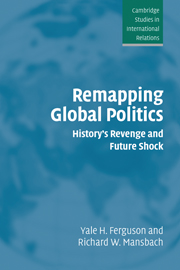Book contents
- Frontmatter
- Contents
- Preface
- Acknowledgments
- 1 Postinternational politics
- 2 Theory and method
- 3 Political space and time
- 4 States and other polities
- 5 Identities in a postinternational world
- 6 A postinternational world economy
- 7 War in a postinternational world
- 8 Technology and change
- 9 The future
- Index
- CAMBRIDGE STUDIES IN INTERNATIONAL RELATIONS
5 - Identities in a postinternational world
Published online by Cambridge University Press: 22 September 2009
- Frontmatter
- Contents
- Preface
- Acknowledgments
- 1 Postinternational politics
- 2 Theory and method
- 3 Political space and time
- 4 States and other polities
- 5 Identities in a postinternational world
- 6 A postinternational world economy
- 7 War in a postinternational world
- 8 Technology and change
- 9 The future
- Index
- CAMBRIDGE STUDIES IN INTERNATIONAL RELATIONS
Summary
In denouncing the use of military tribunals to try enemy prisoners seized by American troops in Afghanistan, an Economist editorial declared that British ministers “have asked for British citizens caught in Afghanistan to be sent home for trial in British courts.” The editorial involves the confusion of identities to alter the nature of an argument. The individuals in question are British citizens, but surely it is not correct (as the editorial implies) that their Britishness is central in this case. Nowhere in the editorial is any reference at all made to ethnicity or religion, which were the real identities that drove these individuals to fight for the Taliban. Were the United States to regard British citizenship as the key identity, then it would have had reason to take its closest ally to task for harboring terrorists or giving them passports to travel abroad. The editorial reflects a narrowly international view of a postinternational universe and helps to illustrate why identities merit our attention.
“The years after the Cold War,” wrote Samuel Huntington, “witnessed the beginnings of dramatic changes in peoples' identities and symbols of those identities. Global politics began to be reconfigured along cultural lines.” Phenomena involving dramatic shifts in identities and identity hierarchies, ranging from the collapse of communism to a proliferation of Islamic terrorism, are having a significant impact on global life.
- Type
- Chapter
- Information
- Remapping Global PoliticsHistory's Revenge and Future Shock, pp. 143 - 180Publisher: Cambridge University PressPrint publication year: 2004

